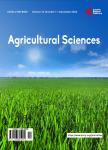Turmeric and Vitamin E on the Performance and Quality of Eggs from White Layers
Turmeric and Vitamin E on the Performance and Quality of Eggs from White Layers作者机构:Agência Paulista de Tecnologia dos Agronegócios Polo Regional do Leste Paulista and UPD Brotas Secretariat of Agriculture and Supply to the State of Sã o Paulo (SAA) Monte Alegre do Sul Brazil Faculty of Veterinary Medicine and Zootechnics State University of Sã o Paulo Botucatu Campus Botucatu Brazil Advanced Center for Poultry Agribusiness Technological Research of the Biological Institute (SAA) Descalvado Brazil
出 版 物:《Agricultural Sciences》 (农业科学(英文))
年 卷 期:2019年第10卷第6期
页 面:720-726页
学科分类:1002[医学-临床医学] 100214[医学-肿瘤学] 10[医学]
主 题:Plant Extracts Productive Performance Phytogenic Additives
摘 要:A 112-day experiment was conducted to evaluate turmeric and vitamin E levels on the productive performance and quality of hen eggs. A total of 432 20-week-old white layers were used, distributed in an entirely randomized design, in a 4 × 3 factor scheme (turmeric extract levels and vitamin E levels), with 6 repetitions of 6 birds per cage. The treatments consisted of four levels of turmeric extract inclusion (0;0.1;0.2 and 0.3) and three levels of vitamin E inclusion (0;50 and 100 IU/kg). Egg quality was evaluated at each 28-day cycle through the variables specific gravity, yolk percentage, albumen percentage, shell percentage and thickness, Haugh unit, yolk index and staining, and production performance: weight, egg production and mass, feed intake, feed conversion (kg/kg;kg/dz), and mortality. The addition of vitamin E alone worsened feed intake, egg weight and feed conversion of layers. Turmeric added to 100 IU of Vit E improved egg mass indices, Haugh Unit and yolk index and intensified yolk staining. The amount of turmeric used in this experiment was not sufficient to improve the performance or egg quality of the birds.



